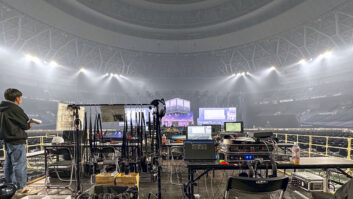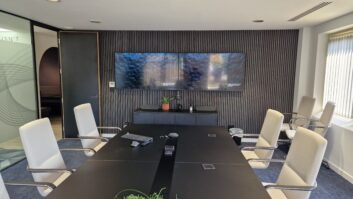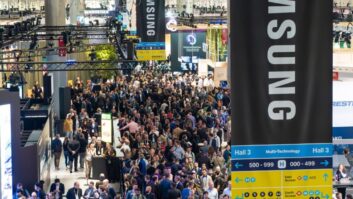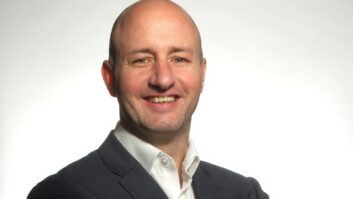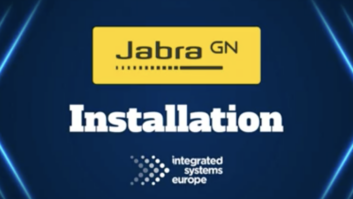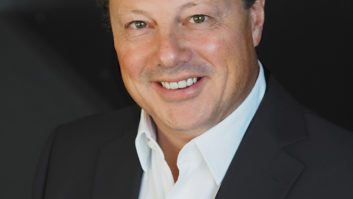
What’s the history of Crane Communications – and how long have you been there?
The company was originally founded in 1976. It was owned by a guy called Roy Logan, who I eventually bought the business from in early 2000. Crane had done some work for me when I was at a previous company, where we needed professional audio installation work carried out, and I had got to know their capability. When I was on the lookout for a business to buy, I heard that maybe Crane was for sale and started talking to Roy.
Previous to working at Crane, my background was more in consulting engineering in the early days, and subsequently fire and security systems. We had put in a number of public address and voice evacuation systems as part of that, and when we needed pro sound, we came to Crane as a specialist. I had a bit of a baptism of fire once I joined Crane, and my experience of pro sound really began in early 2000.
Crane has quite a wide portfolio of customers and technologies: you work in commercial AV, security, and residential AV. Has the company always covered all those bases?
I describe it – probably being kind to myself – as an eclectic mix of products, but there’s certainly method in the madness of how we’ve arrived there. As well as being a sort of pro-sound company, Crane was always a video company as well, and video works hand-in-hand with CCTV. So the company was quite strong in CCTV installations, going back to almost the start of CCTV – well before my time.
With my background in commercial fire and security systems, it seemed like a nice mix to add fire alarms, voice evacuation, intruder alarms and access control onto the CCTV offering. However, it was very clear to me also that the existing audiovisual and pro sound part of the business was strong. I needed to bring myself up to speed in that sector, so we could continue to develop it.
Out of that, the residential AV element came along because we were heavily involved with AMX and Crestron control systems for commercial projects. Going back eight or nine years, we had an architect approach us who had worked with us in commercial audiovisual systems, and asked us to come along and talk about a customer project – which turned out to be a large residence. The spec he gave us was like an MTV Cribs house; he said could we do something, and probably with not a huge amount of thought, we said yeah, I’m sure we can. That was the start of us getting introduced to residential.
Once we did that, we brought guys on board to look after that sector. It started being generated out of our commercial audiovisual work but in itself, it’s now quite a strong business centre within the company.
You have offices in Belfast and in Dublin. What is the split of business in Northern Ireland and the Republic?
Year on year it can change quite substantially. I suppose we would probably never get to anymore than about 50% of our work being south of the border. More recently, however, the Republic has been more quickly and more heavily hit on the economic downturn than the UK. I would say we’re much closer to probably 80/20 at the moment. We’ve a number of direct customers in the south who are still remaining strong, but the general construction industry has been very badly affected. Interestingly, in the south, we don’t offer all the products that we do in the UK – for some of the systems that we offer, it wouldn’t be worth our while going for registration, because for the amount of work we’re likely to get, it just wouldn’t pay off.
To compensate for the downturn, we’re probably doing more work in England, Scotland and Wales than we have ever done. One of the nice things about having this eclectic mix of products and also covering a wide geographical area, it’s been our experience as one sector slows down, another one picks up the slack. And also as one region slows down, another region’s picking up the slack at the moment.
What would you say is your proudest achievement to date?
We won the fire and voice and data installation at Victoria Square. It was a very large urban regeneration shopping centre project in Belfast, where we faced a lot of competition. We’re still a small, local company with 30 direct employees and we were in competition not only with national companies, but with world-wide organisations that work in our sector.
Against these guys we were able to put a proposal together that was seen not only as the best value, but the best solution performance-wise. So I think our proudest moment was probably securing that project and then delivering it on time, on budget, and fulfilling all of the client’s requirements. We completed the project in 2008, but it’s nice to say we’re still involved, providing their ongoing service and amenities requirements.
Not far from that, but for different reasons would be the Rose Bowl (Hampshire Cricket Club) project. [Editor’s note: This will be featured in a forthcoming issue of IE.] It wasn’t anywhere near the same size of project as Victoria Square, but it was an interesting brief, and we were given almost no time to complete the project, with a very definite back-stop of the England/Australia cricket match that was being televised. Bringing that job across the line prior to the agreed completion date was also right up there in terms of good moments within the company.
If you could change one thing about the industry, what would it be?
I’d like to see more pre-qualification for contracts. In the awarding of contracts there’s less and less emphasis placed on a company’s prior performance and their prior delivered projects – their capability, if you like. More and more contracts seem to be awarded purely on a pound-note basis – whoever is cheapest, not necessarily best, or offering the best value for money, or whoever’s got the most capability. So if I was going to change something, I would probably look at that. And re-prioritise the way people look at experience.
There are lots of other things I’d like to change as well, such as payment practices. I know a lot of customers pay their bills very quickly in accordance with what they’re contractually bound to do – it’s a shame that being down the contractual food chain, we more often than not end up in the situation where we almost have to accept what we’re given. It would be very useful if the government would look at some sort of legislation to protect specialist suppliers and subcontractors like ourselves, in terms of guaranteeing payments within a reasonable timeframe.
Do you have any personal ambitions still unfulfilled?
A bit more free time would be nice! Being a relatively small business it’s not nine to five, and it’s not Monday to Friday. We’re very much at the mercy of what our customers require us to do. At the moment, I think everybody’s in the same situation – while work is scarce, you just have to go the extra mile a bit more often. So it would be nice maybe, at some point in the future, to be able to cut back on the hours; to holiday a bit more and see more of the world would be great to do.
